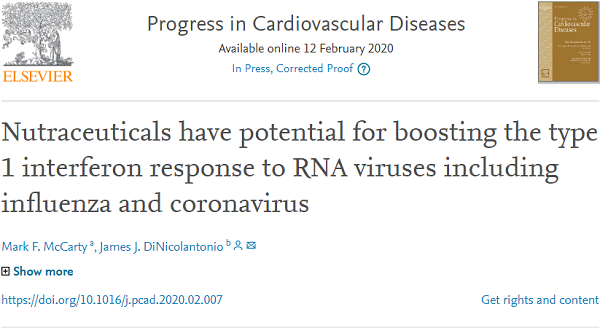
IPFS News Link • Health and Physical Fitness
Spirulina found to boost the body's type 1 interferon response to fight RNA viral infections
• Natural News - Mike Adams(Natural News) A new study published in Progress in Cardiovascular Disease on February 12 of this year reveals that spirulina may have tremendous potential to boost the body's type 1 interferon response in fighting RNA viral infections.
While no substance has yet been proven to treat or prevent coronavirus infections, many new candidates are emerging from the world of nutraceuticals. In fact, the title for this study is, "Nutraceuticals have potential for boosting the type 1 interferon response to RNA viruses including influenza and coronavirus." Several nutraceuticals are named in the study (see summary table below).
The study is found at this link:
https://doi.org/10.1016/j.pcad.2020.02.007
There, study authors explain the mechanism by which a spirulina component called phycocyanobilin (PCB) mimics bilirubin, allowing it to "mimic the NAPDH oxidase inhibiting activity" which means it blocks a key physiological mechanism used by RNA viruses to replicate in the human body.

The study begins by explaining the context of the importance of looking at nutraceuticals that may help stop the spread of the coronavirus:
In light of worldwide concern regarding the recent outbreak of a deadly novel strain of coronavirus in China, it is fortuitous that two recent discoveries point the way to effective nutraceutical measures for potentiating the type 1 interferon response to RNA viruses.
Here's the full explanation from the study:
Moreover, the phycocyanobilin (PCB) chromophore of cyanobacteria (such as spirulina) and many types of blue-green algae, a biliverdin metabolite, has been shown to mimic the NAPDH oxidase inhibiting activity of unconjugated bilirubin, likely because it is rapidly converted within cells to phycocyanorubin, a compound very similar in structure to bilirubin.11,12 This phenomenon likely explains many of the profound antioxidant and anti-inflammatory effects observed when spirulina, phycocyanin (the prominent spirulina protein incorporating PCB as a chromophore), or PCB itself are administered in rodent models of human pathology.11,13 Hence, ingestion of spirulina or of spirulina extracts enriched in PCB may have potential for boosting type 1 interferon response in the context of RNA virus infection. Oral administration of a cold-water spirulina extract rich in phycocyanin has been found to decrease mortality in influenza-infected mice.
The study looked at several different nutraceuticals that may show real promise in protecting people from RNA viral infections. Here's a quick summary from the study:

































